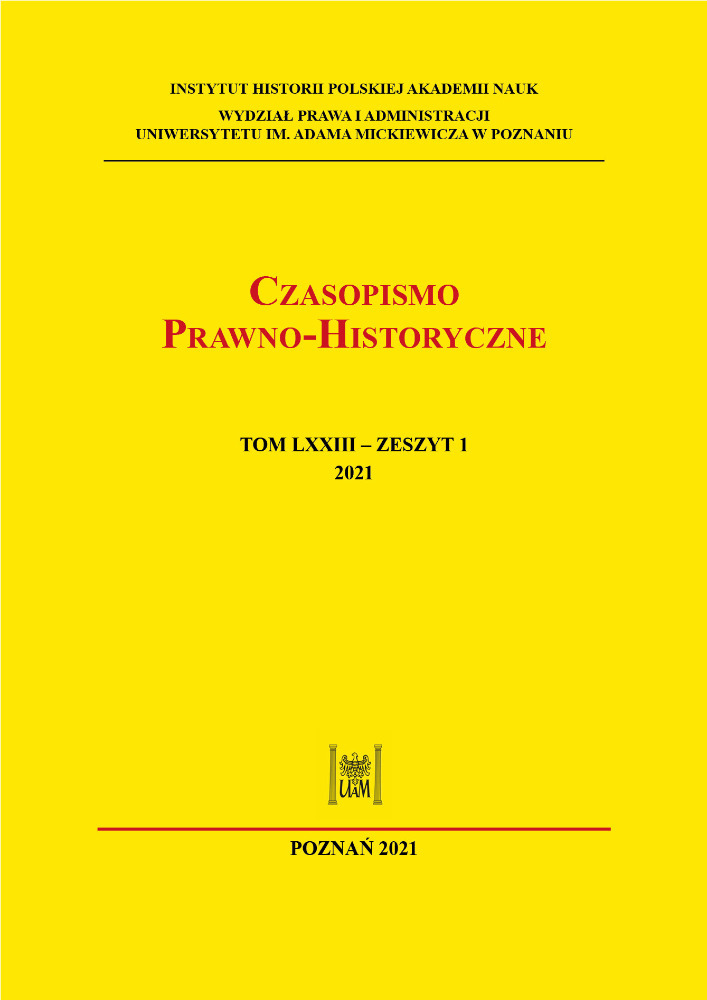Abstrakt
Przedmiotem artykułu jest życie i twórczość Andrew MacDoualla – szkockiego adwokata, sędziego Sądu Sesji działającego jako lord Bankton oraz pisarza instytucjonalnego. Celem autora jest przedstawienie kariery jurysty, który łączył wysoki poziom praktyki adwokackiej z komparatystycznym spojrzeniem na system prawny XVIII-wiecznej Szkocji. Efektem tej działalności jest wydany między 1751 a 1753 r. trzytomowy traktat prawniczy – Instytucje prawa szkockiego, który zyskawszy uznanie w oczach ówczesnej praktyki prawa szkockiego, zapewnił autorowi poczesne miejsce w gronie najwybitniejszych przedstawicieli szkockiej jurysprudencji, których opinie traktowano jako subsydiarne źródło prawa.
Bibliografia
Bell G.J., Commentaries of the Laws of Scotland in the Relation to Mercantile and Maritime Law, Moveable and Heritable Rights and Bankruptcy, Edinburgh 1810.
Black H.C., A Dictionary of Law: Containing Definitions of the Term and Phrases of American and English Jurisprudence, Ancient and Modern, London 1891.
Blackie J., Andrew MacDougall, Lord Bankton [w:] H.C.G. Matthew, B. Harrison (red.), Oxford Dictionary of National Biography, Oxford 2004, https://www.oxforddnb.com/view/10.1093/ref:odnb/9780198614128.001.0001/odnb-9780198614128-e-17471 [dostęp: 27.03. 2021].
Blackie J., Stair’s Later Reputation as a Jurist [w:] D.M. Walker (red.), Stair Tercentary Studies, Edinburgh 1981.
Bruton G.H.D., An Historical Account of the Senators of the College of Justice: From its Institution, Edinburgh 1836.
Cairns J.W., Institutional Writings in Scotland Reconsidered, „Journal of Legal History” 1983, nr 4, 76–117.
Cairns J.W., Law Books, 1707–1918 [w:] S. Mannig (red.), The Edinburgh History of Scottish Literature: Enlightenment, Britain and Empire (1707–1918), t. 2, Edinburgh 2006.
Darlymple J., Viscount of Stair, Institutions of the Law of Scotland, Edinburgh 1681.
Erskine J., Principles of the Law of Scotland, Edinburgh 1754.
Erskine J., The Institute of the Law of Scotland, Edinburgh 1773.
Evans-Jones R., Receptions of Law, Mixed Legal Systems and the Myth of the Genius of Scots Private Law, „Law Quarterly Review” 1998, nr 114.
Finlay J., The Community of the College of Justice: Edinburgh and the Court of Session, 1687–1808, Edinburgh 2012.
Gordon W.M., Introduction – Bankton’s Life [w:] A. MacDouall, Lord Bankton, Institute of the Laws of Scotland in Civil Rights, with Observations upon the Agreement of Diversity between them and the Laws of England in Four Books. After the General Method of the Viscount of Stair’s Institutions, t. 3, Edinburgh 1995.
Gordon W.M., Roman Law in Scotland [w:] R. Evans-Jones (red.), The Civil Law Tradition in Scotland, Edinburgh 1995.
Grant F., The Faculty of Advocates in Scotland, 1532–1943 with Genealogical Notes, Edinburgh 1944.
Macdowall F., Macdouall W., The MacDowalls, Edinburgh 2009.
MacDouall A., Lord Bankton, An Essay upon Feudal Holdings, Superiorities, and Hereditary Jurisdictions in Scotland, London 1747.
MacDouall A., Lord Bankton, An Institute of the Laws of Scotland in Civil Rights, with Observations upon the Agreement of Diversity between them and the Laws of England in Four Books. After the General Method of the Viscount of Stair’s Institutions, t. 1–3, Edinburgh 1751–1753.
McLeod G., The Romanization of Property Law [w:] K. Reid, R. Zimmerman (red.), A History of Private Law in Scotland, t. 1, Oxford 2000.
Murray T., Literary History of Galloway, Edinburgh 1832.
Ramsay J., Scotland and Scotsmen, t. 1, Edinburgh 1888.
Reid K., Zimmermann R., The Development of Legal Doctrine in a Mixed Legal System [w:] K. Reid, R. Zimmerman (red.), A History of Private Law in Scotland, t. 1, Oxford 2000.
Smith T.B., The Doctrine of Judicial Precedent, Edinburgh 1952.
Walker D.M., Legal Scholarship in Scotland in the modern Period, „Scottish Law Times” 1960, nr 10.
Windram W.J., MacQuenn H.L., The Sources and Literature of Scots Law, „Journal of Legal History” 1983, nr 4.
Zimmerman R., Dieckmann A.J., The Literature of Scots Private Law, „Stellenbosch Law Review” 1997, nr 8.
Licencja
Prawa autorskie (c) 2021 Mateusz Szymura

Utwór dostępny jest na licencji Creative Commons Uznanie autorstwa – Na tych samych warunkach 4.0 Miedzynarodowe.





